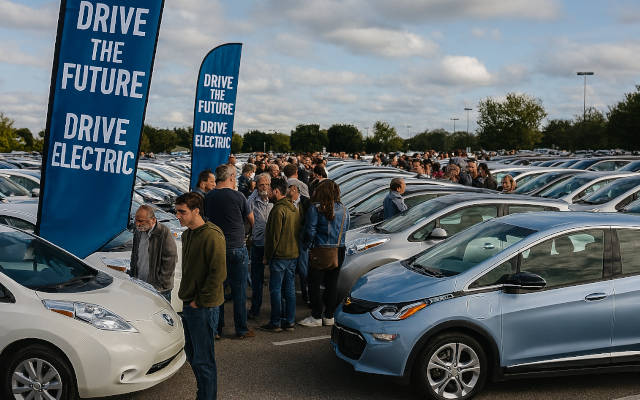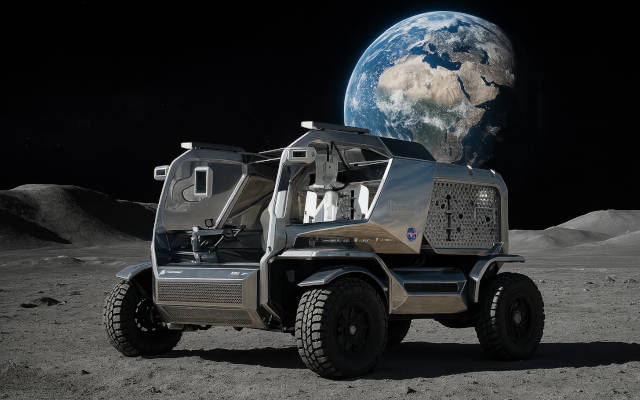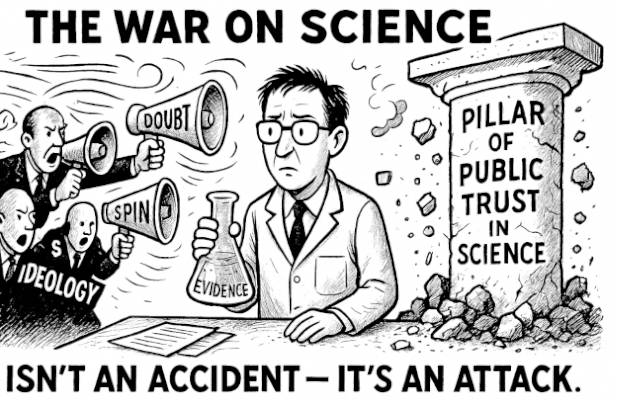 EDITOR'S PICK
EDITOR'S PICK
2026 Will Be The 'Year Of The Used EV,' Analyst Says. Here's Why
04 Oct 2025 | Synopsis
 Used EV prices are nearing parity with gas cars, boosting demand despite the end of federal tax credits. Analysts predict 2026 will be the “year of the used EV,” driven by affordability and a surge in lease returns. In August, used EV sales rose 59% year-over-year. Some models, like the Nissan Leaf and Chevy Bolt, are priced under $15,000. State incentives and lower battery costs continue to support the market.
Used EV prices are nearing parity with gas cars, boosting demand despite the end of federal tax credits. Analysts predict 2026 will be the “year of the used EV,” driven by affordability and a surge in lease returns. In August, used EV sales rose 59% year-over-year. Some models, like the Nissan Leaf and Chevy Bolt, are priced under $15,000. State incentives and lower battery costs continue to support the market.NASA Moon Rover Project Pushes Extreme Battery Tech To Its Limits
03 Oct 2025 | Synopsis
 GM is adapting its EV battery tech for NASA's Lunar Terrain Vehicle, part of Artemis V. Using durable lithium-ion packs with high-nickel NCMA cathodes, the rover will withstand extreme lunar conditions -temperatures from - 173°C to scorching highs - while operating reliably for 10 years. Four steerable wheels with crab-walk and zero-turn features boost mobility, and fault-tolerant design ensures function even if cells fail, extending U.S. exploration on the Moon.
GM is adapting its EV battery tech for NASA's Lunar Terrain Vehicle, part of Artemis V. Using durable lithium-ion packs with high-nickel NCMA cathodes, the rover will withstand extreme lunar conditions -temperatures from - 173°C to scorching highs - while operating reliably for 10 years. Four steerable wheels with crab-walk and zero-turn features boost mobility, and fault-tolerant design ensures function even if cells fail, extending U.S. exploration on the Moon.Ford Faces EV Crossroads as Federal Incentives Expire
02 Oct 2025 | Synopsis
 Ford CEO Jim Farley warns that U.S. EV sales could drop by half following the expiration of the $7,500 federal tax credit, citing high vehicle costs and reduced consumer demand. Ford is shifting focus to hybrids and more affordable EVs, while some dealers see the change as a chance to test market strength without subsidies. The industry faces uncertainty as it adapts to a post-incentive landscape.
Ford CEO Jim Farley warns that U.S. EV sales could drop by half following the expiration of the $7,500 federal tax credit, citing high vehicle costs and reduced consumer demand. Ford is shifting focus to hybrids and more affordable EVs, while some dealers see the change as a chance to test market strength without subsidies. The industry faces uncertainty as it adapts to a post-incentive landscape.The LNG Detour: What Scotland's New Ferry Teaches US
02 Oct 2025 | Synopsis
 Scotland's Glen Sannox ferry, launched as a “green” LNG-powered vessel, emits more greenhouse gases than its diesel predecessor due to underestimated methane slip. Despite improved local air quality, real-world data shows LNG's climate impact is worse over short timeframes. The project highlights how optimistic assumptions and delayed construction turned a sustainability effort into a cautionary tale about transitional fuels and lifecycle emissions.
Scotland's Glen Sannox ferry, launched as a “green” LNG-powered vessel, emits more greenhouse gases than its diesel predecessor due to underestimated methane slip. Despite improved local air quality, real-world data shows LNG's climate impact is worse over short timeframes. The project highlights how optimistic assumptions and delayed construction turned a sustainability effort into a cautionary tale about transitional fuels and lifecycle emissions.The Current War On Science, Who's Behind It And Why
02 Oct 2025 | Synopsis
 Science Under Siege asserts the undermining of science is not accidental but largely driven by ideological, economic, and political forces. It points fingers at special interests, political actors, and media amplifying doubt for gain. It also critiques how scientists themselves sometimes contribute by failing to communicate clearly or by letting funding and institutional pressures interfere with objectivity. The result: erosion of public trust, polarized discourse, and weakened science-based policy.
Science Under Siege asserts the undermining of science is not accidental but largely driven by ideological, economic, and political forces. It points fingers at special interests, political actors, and media amplifying doubt for gain. It also critiques how scientists themselves sometimes contribute by failing to communicate clearly or by letting funding and institutional pressures interfere with objectivity. The result: erosion of public trust, polarized discourse, and weakened science-based policy.
 Si Exclusive
Si Exclusive
Rivian's Infotainment Revolution: AI at the Wheel, No Smartphone Required
11 Oct 2025 |  Rivian's infotainment system replaces CarPlay with a native AI-powered interface backed by Amazon and Volkswagen. It offers smart navigation, voice control, music/video streaming, and cloud-based personalization. AM radio is excluded, prompting bipartisan legislation to mandate its return. Autonomous driving integration is planned, with updates rolling out in 2025 and full features expected in the R2 by 2026.
Rivian's infotainment system replaces CarPlay with a native AI-powered interface backed by Amazon and Volkswagen. It offers smart navigation, voice control, music/video streaming, and cloud-based personalization. AM radio is excluded, prompting bipartisan legislation to mandate its return. Autonomous driving integration is planned, with updates rolling out in 2025 and full features expected in the R2 by 2026.
Hydrogen's Flight Path: Fuel Cells, Turbines, and the Economics of Clean Aviation
10 Oct 2025 |  Aviation is shifting from Jet A to four fuel systems: electricity, hydrogen (fuel cell and combustion), SAF, and petroleum. Fuel cells suit short-haul aircraft; hydrogen combustion may power long-range jets. SAF bridges legacy fleets. Hydrogen costs - $5-$7/kg today, possibly $2/kg by 2040 - impact ticket prices and infrastructure decisions. Airport authorities, airlines, and governments will share deployment costs. Each fuel has distinct environmental pros and cons shaping aviation's net-zero future.
Aviation is shifting from Jet A to four fuel systems: electricity, hydrogen (fuel cell and combustion), SAF, and petroleum. Fuel cells suit short-haul aircraft; hydrogen combustion may power long-range jets. SAF bridges legacy fleets. Hydrogen costs - $5-$7/kg today, possibly $2/kg by 2040 - impact ticket prices and infrastructure decisions. Airport authorities, airlines, and governments will share deployment costs. Each fuel has distinct environmental pros and cons shaping aviation's net-zero future.
Ferrari Elettrica: Electrified, Not Tamed
09 Oct 2025 |  Ferrari's Elettrica EV delivers over 1,000 hp via quad motors, hitting 0-100 km/h in 2.5s with a 330+ mile range. Its 122 kWh battery sits low for balance, paired with active suspension and rear steering. Designed by LoveFrom, the four-door GT aims to preserve Ferrari's emotional DNA. Priced around $580K, it launches in 2026 in Europe and the U.S., with hybrids and ICE models still dominating until 2030
Ferrari's Elettrica EV delivers over 1,000 hp via quad motors, hitting 0-100 km/h in 2.5s with a 330+ mile range. Its 122 kWh battery sits low for balance, paired with active suspension and rear steering. Designed by LoveFrom, the four-door GT aims to preserve Ferrari's emotional DNA. Priced around $580K, it launches in 2026 in Europe and the U.S., with hybrids and ICE models still dominating until 2030
 11 Oct 2025 22:14:31 UTC |
RECENT PODCASTS
BYD Soars - Cheaper Tesla Models - The Bolt is Back - Rivian
SEARCH RSSTREAM
 57 New Postings In Past 24 Hours
57 New Postings In Past 24 Hours
Category:mobility
Region:NoAmerica
Date:11 Oct 2025
Category:energy
Region:Global
Date:11 Oct 2025
Category:policy
Region:NoAmerica
Date:11 Oct 2025
Category:mobility
Region:NoAmerica
Date:11 Oct 2025
Category:finance
Region:NoAmerica
Date:11 Oct 2025
Category:mobility
Region:NoAmerica
Date:11 Oct 2025
Category:mobility
Region:SoAmerica
Date:11 Oct 2025
Category:finance
Region:SoAmerica
Date:11 Oct 2025
Category:mobility
Region:AsiaPacific
Date:11 Oct 2025
Category:finance
Region:AsiaPacific
Date:11 Oct 2025
Category:finance
Region:AsiaPacific
Date:11 Oct 2025
Category:mobility
Region:AsiaPacific
Date:11 Oct 2025
Category:mobility
Region:Global
Date:11 Oct 2025
Category:policy
Region:NoAmerica
Date:11 Oct 2025
Category:mobility
Region:Africa
Date:11 Oct 2025